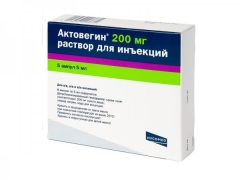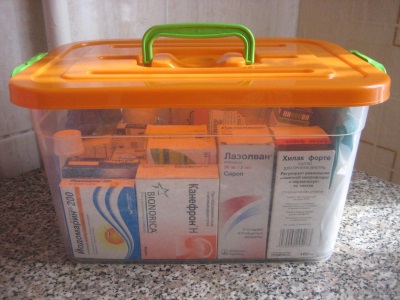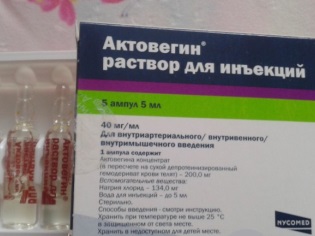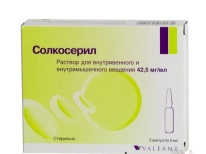Actovegin child
Actovegin is a popular drug recommended for problems with the nervous system and many other diseases. Why is this medicine prescribed for children, can it be applied at 6 months, how to give Actovegin correctly and can negative reactions to this drug occur in babies who have been prescribed Actovegin treatment?
Release form
You can buy Actovegin in this form:
- Solution for pricks. It is represented by a clear liquid, which is often colorless, but may have a slight yellow tint. The solution is packaged in ampoules with a capacity of 2 ml and 5 ml, as well as 10 ml. The content of active ingredient per 1 ml is 40 mg.
- Tablets in the shell. Each tablet contains 200 mg of active substance, and the package contains 50 tablets.
- Means for external use. It may be a gel, cream or ointment. In such forms, the content of the active ingredient is 5% or 20%.
Actovegin does not have such release forms as syrup or capsules.
Composition
The active ingredient of Aktovegin is represented by a calf blood extract. It is cleaned and dried, obtaining deproteinized hemoderivate containing amino acids and low molecular weight peptides.
Sterile water and sodium chloride are additionally present in the injection solution. Actovegin tablets contain auxiliary ingredients such as talc, microcrystalline cellulose, hypromellose, acacia, wax, sucrose, and some other substances.
Operating principle
The use of Actovegin has the following effect:
- The drug improves the absorption of oxygen by the brain cells.
- It promotes the formation of acetylcholine and ATP in brain cells.
- The drug helps glucose to better penetrate into the neurons, which positively affects the nutrition of brain cells.
- The tool acts as a strong antioxidant.
- The medicine also has a beneficial effect on the liver cells and myocardial tissues.
Watch a very interesting video, which describes the principle of Actovegin's action:
At what age is it allowed to take?
Instructions for use of Actovegin does not report the acceptable age of prescribing such a drug in pediatrics, it is used from birth, if there are indications for this.
Neurologists often prescribe such a drug to an infant if the baby has experienced hypoxia during childbirth, for example, due to cord entanglement or a long-term birth process. This baby Actovegin can be discharged either immediately after birth or at 1 month or 3 months.
Indications
In childhood, the reason to appoint Actovegin is:
- Chronic fetal hypoxia during pregnancy.
- Acute hypoxic brain damage during childbirth.
- Brain trauma during childbirth.
- Non-birth traumatic brain injury.
- Lag in neuropsychic development.
- Problems with speech (ZRR).
- Circulatory disorders in the brain.
- Hyper-irritability of the child.
- Frequent regurgitation.
- Tremor of the feet or handles.
- Learning problems.
Local forms of medication prescribed for burns, bedsores, ulcers and other skin lesions.
Contraindications
Appointment Actovegin prohibited when:
- Allergies to its components.
- Heart failure.
- Swelling.
- Renal dysfunction.
- Convulsive syndrome.
Side effects
Sometimes the children's body reacts to treatment with Actovegin by allergic reactions, therefore, the use of medication begins with an allergic test.
The drug can provoke fever, skin rash or redness of the skin. In some children, the drug causes anaphylactic shock.
Introduction of Actovegin in the afternoon may cause sleep disturbance. If local forms of Actovegin are used (ointment, cream or gel), burning or itching may occur at the site of skin treatment.
Instructions for use and dosage
Most often, the child is prescribed Actovegin injections, since this form of medication is more effective than the others. Tablets contain too high a dose, so they have to be divided, and the damage to the shell affects the therapeutic effect of the drug.
The dosage is determined by the age and weight of the child:
- A newborn, a month-old baby and children under one year old should put 0.4-0.5 ml of Actovegin solution for each kilogram of weight.
- Children aged 1 to 3 years, also administered 0.4-0.5 ml of medicine per 1 kg of weight.
- At the age of 3-6 years, the dosage of Actovegin per 1 kg of body weight will be from 0.25 to 0.4 ml.
- Children 6-12 years of age are administered daily from 5 to 10 ml of the drug.
- At the age of 12 years, the daily dose is 10-15 ml of Actovegin.
The drug is administered intravenously once a day. If the introduction of a vein is not possible, the drug is administered intramuscularly, but it is quite painful and less effective. To reduce the pain of the injection, it is acceptable to mix Actovegin and Novocain, but only after testing for an allergy to such an anesthetic.
The tablet form is prescribed for less severe lesions of the nervous system. As a rule, Actovegin tablets are included in the complex treatment together with other preparations for the brain, and the neurologist selects the dose individually. A pill is drunk before meals with water.
Overdose
About the negative effect of Actovegin in too high a dosage is not known.
Interaction with other drugs
Actovegin is permissible to use together with drugs such as Mildronat, Curantil, vitamins of group B, Cavinton, Riboxin, Piracetam, Cortexin and many other drugs prescribed for encephalopathy, developmental delay and other problems of the central nervous system.
The drug is compatible with glucose and sodium chloride solutions, and other drugs should not be administered with Actovegin. An exception is made only for Novocain with intramuscular injections.
Watch the video about the effect of the drug Actovegin on the body of athletes:
Terms of sale
Buying Actovegin in a pharmacy is possible only after presenting a prescription from the doctor. A pack of 50 tablets costs about 1400-1500 rubles, and for 5 ampoules of 2 ml of Actovegin, you need to pay about 600 rubles.
Storage conditions and shelf life
Actovegin tablet form is stored at a temperature not exceeding +25 degrees Celsius in a place where the child cannot reach. The solution for injections should be stored under the same conditions if the vials are intact. After opening, the medicine is not stored, but used immediately, since there are no preservatives inside the ampoules. Shelf life of the drug - 3 years.
Reviews
On the use of Actovegin in children there are both positive reviews and complaints of inefficiency. Moms, who noted the good effect of this medicine, emphasize that Actovegin helped to eliminate the effects of the central nervous system damage during childbirth or in case of injury.
They also note mainly the good tolerability of the drug. Allergic reactions to Actovegin are rare, and most babies do not detect side effects.
Mostly, positive changes are seen in children with speech delay, when the child simultaneously takes Actovegin and Cortexin. Mothers notice that the baby is animated, speaks better, responds adequately to requests.
Reviews of doctors about this drug are also mostly good. Neurologists have long used it in pediatric practice, noting the neuroprotective effect and high efficacy in encephalopathy.
Analogs
A drug with the same effect as that of Actovegin is Solcoseryl. The basis of this medicine is also the purified blood of calves. The tool is available in solution for injection, as well as in the form of a gel, ointment and paste.
Replacing Actovegin in the treatment of children is possible for other drugs that act on the brain. However, any of these funds must appoint a specialist. Instead of Actovegin, the doctor may recommend:
- Cortexin.
- Mexidol.
- Glycine.
- Aminalon.
- Vinpocetine.
- Nootropil.
- Pantogam.
- Cerebrolysin.
- Piracetam.
All these drugs improve brain activity and have a positive effect on neuropsychic development, but they cannot be used without consulting a doctor.






















